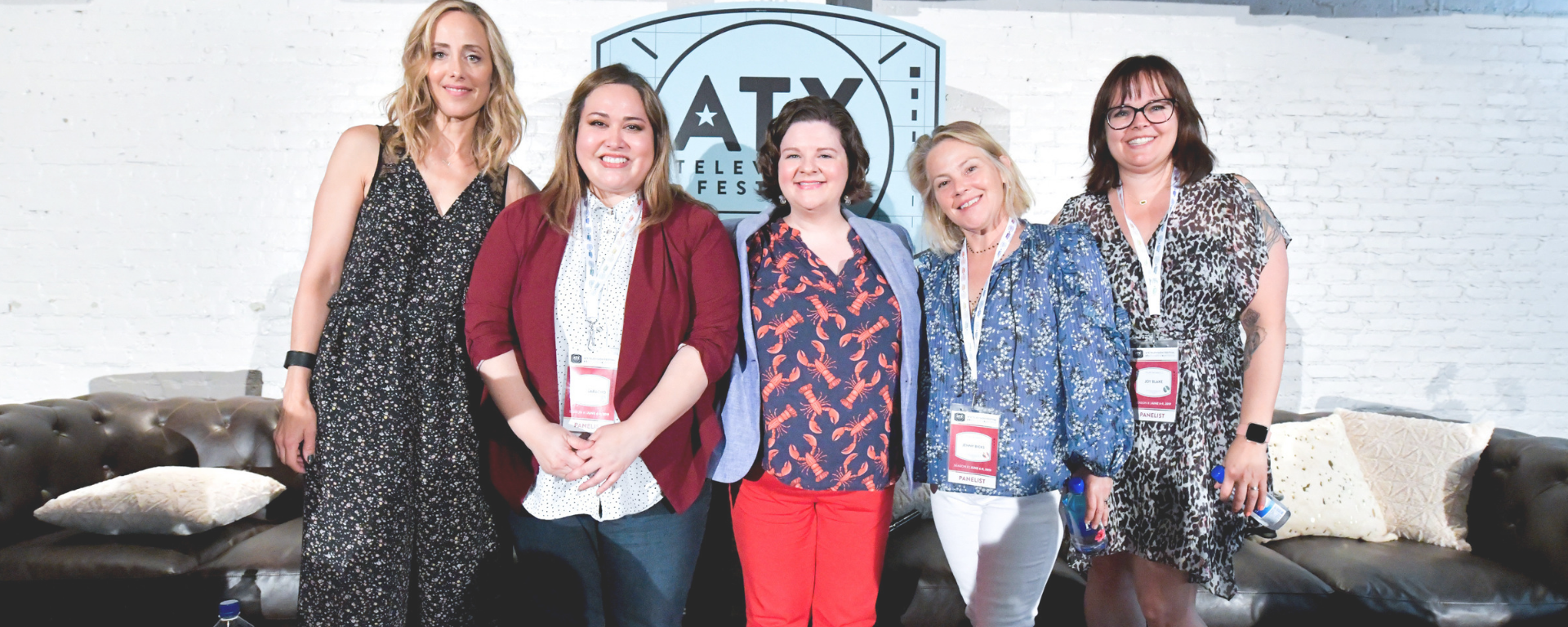Austin TV Festival put together another fantastic panel for women: “The Female Gaze” on Sunday, June 10, the final day of the festival. This was the last panel I attended and I’m so glad I was able to get a fast pass for this one.
Panel Summary
The “male gaze,” largely acknowledged as “the act of depicting women and the world from a masculine, heterosexual perspective that represents women as sexual objects,” has been the dominant viewpoint since the beginning of art and culture — but what happens when women become the subject instead of the object? This conversation will explore the “female gaze” with writers & directors who are reclaiming female agency by (figuratively and literally) shifting viewers’ perspectives, and telling stories that unapologetically place women and their world view at the center.
The Female Gaze Panelists

- Tanya Saracho, Creator/Executive Producer of Vida
- Kim Raver, Director/Executive Producer of Tempting Fate
- Joy Blake, Producer/Writer of Outlander
- Jenny Bicks, Creator/Executive Producer of Men In Trees
Panel Recap
Tara Ariano, co-host of the entertainment podcast Extra Hot Great, led and moderated the panel.
How many execs were women on your respective projects?
Bicks and Blake responded that they had only two executives who were women on Men In Trees and Outlander. Raver responded that it was “mostly women on Shondaland” and there were definitely a lot more women executives at Lifetime. WOOHOO Lifetime! Saracho said that she only answers to one boss and luckily her boss is also a woman.
Bicks added that now she mostly works with female execs, which was not the case back when she was on Men In Trees in 2007.
At the very top, it is still male. [But] we’re getting better. Given where I am in the power structure now, I can say “go fuck yourself.”
Jenny Bicks, Creator/Executive Producer of Men In Trees
What does “likeable” even mean for women in the entertainment industry?

Bicks explained that being “likeable” meant that “your character did something she shouldn’t do, but when a man does it, he’s ‘ballsy’.”
Raver added to Bicks’ comment: “If I’m opinionated, loud, or passionate, I can come across as bitchy or a problem. If a man had those qualities, he’s talented or a badass.” Women in the entertainment industry, and in other other fields, operate on a playing field historically and systematically advantageous to cisgender men higher up on the totem pole.
“It’s an unfair way I feel women have to behave to be heard.”
Kim Raver, Director/Executive Producer of Tempting Fate
Tara brought up how there are studies that show statistics of how much women speak on screen.
The stats I researched
While I do not recall the exact numbers that the moderator Tara mentioned in the panel, I researched exactly how often women speak on screen compared to men. According to womenandhollywood.com, looking at the top 100 grossing films in 2018, women accounted for 36% of major characters and 35% of all speaking characters. Overall, audiences were almost twice as likely to see male characters as female characters.
https://tenor.com/embed.jsWhen we look at the 2017-2018 television season, women “comprised 40% of all speaking characters,” which is less than the level achieved in 2012-13 when women accounted for 42% of all speaking characters. Those are just two examples of statistics reported. Womenandhollywood.com breaks down even more statistics by race and role too.
The Center for the Study of Women in TV & Film also does research on this, and it is worth going down an angry rabbit hole.
Back to the panelists
Blake talked about how women are fighting to get more female characters. Saracho brought up an excellent point: we don’t just want more women on screen, we want more women on screen who are “compelling but flawed.” Raver pointed out that overall, the percentage of female directors is about 17%, but on the Lifetime Network, it is 78%.
https://tenor.com/embed.jsDAMN LIFETIME. I AM SO PROUD OF Y’ALL. Now, other networks, you need to get on board with this. Like now.
Saracho added that many “white men think women of color and people of color are coming for their jobs,” and Raver, like the sassy, incredible woman she is, commented “we are.” Saracho states that showrunners of color only make up 7%, and that is all people of color showrunners. It’s… quite sad.
Bicks talked about being in rooms years ago with 12 to 15 men.
I felt like the unicorn in the room
Jenny Bicks, Creator/Executive Producer of Men In Trees
Given men’s POV for sex in pop culture, does this put the responsibility on women creators to show bad sex?
Saracho explained how on her Starz show Vida, “every scene was necessary–no gratuity. I want to portray [sex] as realistic as I can.”
Blake brought up the Netflix series Sex Education and how the series is a good example of portraying realistic sex scenes among teenagers. If WOC and POC writers can have the opportunity to tell authentic stories in a realistic way, then we’re making progress in the TV and film industry.
Bicks brought up the HBO drama Sex and The City, and how even with the way they shot the scenes with the women talking about sex, people thought gay men wrote the scenes because they couldn’t believe women were writing scenes for women talking about sex.
How does Raver portray characters in Tempting Fate?
Raver explained that betrayal was the theme of the film and that the film is a coming-of-age for women. (No spoilers though!)
Women are seen as coming-of-age when they’re 13. I take the theme of [the main female character] finding out who she is when she is not in service to her husband and kids.
Kim Raver, Director/Executive Producer of Tempting Fate
You can read our other panel recaps from Austin TV Festival! Check out “Let’s Talk About Sex (Scenes)” or the Archer screening and panel.
Featured image credit: ATX TV Festival

